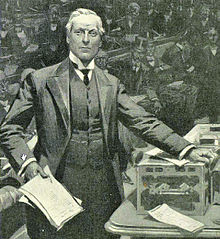Reading a fascinating book by George Dangerfield written in 1935, called "The Strange Death of Liberal England" I am struck by the prose and the lofty, somewhat supercilious air that this man of letters has towards the movers and shakers of the period he writes about at the turn of the century (1900) and the great issue of the day, "Home Rule for Ireland".
The justification for granting Ireland Home Rule and the outrage this produced in Protestant Ulster, as well as the subsequent rage amongst the Tories towards Asquith's led Liberal government infected the relationship between the two parties. The Liberals had made pledges to that rump of Irish politicians in the British Parliament which made Home Rule for the island of Ireland a necessity. The Irish with characteristic fervour had pursued their cause and many an Irish landowner, part of the Irish aristocracy, spent their days haranguing the delicate susceptibilities of a Liberal conscience. The Tories were no less enrages at the thought of their land owning cousins in Ulster being thrust under Papal dominance.
The outcome we know and since events were overtaken by the Great War the ire and dislike which arose in Parliament over this matter was one of the reasons the Liberals were greatly diminished and slowly cast out from being a political force in British Politics.
Fascinating as this period is, even more fascinating is the eloquent yet waspish tongue of Mr Dangerfield. Written from a position of hindsight, his book was applauded and highly rated by historians and the academic fraternity and whilst I find it immensely entertaining, illustrative of the period and the political actors of that period, I find myself worrying about the power of the written word to obfuscate and obscure the true picture.
There is a turn of phrase and a sense of pomposity which the English are famous.
Mr Dangerfield, like Loyd George, Bernard Shaw and most famously, Mr Churchill, used the English language to weave a picture which had the mist of folk law entwined in the fabric of truth. The ability, through oratory to raise people to emotional incontinence is a dangerous gift, with little thought to the tensions raised within local communities where the players are deeply entwined with day to day prejudice.
Never the less, a great read and a fascinating insight into a period which saw the gradual demise of British hegemony.

No comments:
Post a Comment